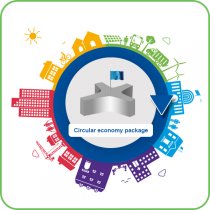Home /
News /
In-depth news /
Circular economy
next > < previous

Waste management and circular economy

Circular economy - 04.12.2015
Positive steps forward in circular economy package
The European Commission published its long awaited Circular Economy package on 2 December. Here we take a look at what the new package looks like, what CEMR thinks about it, how it will be financially supported and what are the next steps.
What is the package all about?
The revision of the waste legislative framework is the backbone of the European Commission’s package. In December 2014, the Commission decided to withdraw a pending legislative proposal on waste, as part of the political discontinuity exercise carried out for the first Work Programme of the Juncker Commission.
The new proposals cover the full lifecycle of products: from production and consumption to waste management and the market for secondary raw materials. It consists of a Communication ‘closing the loop – an EU action plan for the Circular Economy’, an annex listing the different actions planned and the corresponding timetable, and four directives, amending the existing directives on: waste; packaging waste; landfill; and electrical and electronic waste.
What does CEMR think about it?
CEMR is pleased to see that most of our key issues that we addressed in relation to the Commission’s previous proposal of 2014, have been taken into account in the new proposal for a revised waste directive.
How will it be financed?
The transition to a more circular economy will be supported financially by ESIF funding, €650 million from Horizon 2020 (the EU funding programme for research and innovation), €5.5 billion from structural funds for waste management, and investments in the circular economy at national level.
Next steps
The package will now be discussed between the European commission, the European parliament and the European council before a final agreement in 2016.
What is the package all about?
The revision of the waste legislative framework is the backbone of the European Commission’s package. In December 2014, the Commission decided to withdraw a pending legislative proposal on waste, as part of the political discontinuity exercise carried out for the first Work Programme of the Juncker Commission.
The new proposals cover the full lifecycle of products: from production and consumption to waste management and the market for secondary raw materials. It consists of a Communication ‘closing the loop – an EU action plan for the Circular Economy’, an annex listing the different actions planned and the corresponding timetable, and four directives, amending the existing directives on: waste; packaging waste; landfill; and electrical and electronic waste.
What does CEMR think about it?
CEMR is pleased to see that most of our key issues that we addressed in relation to the Commission’s previous proposal of 2014, have been taken into account in the new proposal for a revised waste directive.
- It includes a broader definition of municipal waste and no longer limits the definition simply to the waste that is collected by local authorities;
- The new text also takes into consideration waste that is used to produce energy and separate collection of bio-waste shall be ensured where technically, environmentally and economically is practicable and appropriate;
- The early warning reporting system has been simplified and furthermore, the landfill directive now proposes a differentiated approach to the situation existing in the Member States;
- The revised proposal for a waste directive sets concrete targets for reducing waste: a common EU target for recycling 65% of municipal waste and recycling 75% of packaging waste ; and a binding landfill target to reduce landfill to maximum of 10% of all waste by 2030.
How will it be financed?
The transition to a more circular economy will be supported financially by ESIF funding, €650 million from Horizon 2020 (the EU funding programme for research and innovation), €5.5 billion from structural funds for waste management, and investments in the circular economy at national level.
Next steps
The package will now be discussed between the European commission, the European parliament and the European council before a final agreement in 2016.
 shqiptar
shqiptar български
български hrvatski
hrvatski čeština
čeština dansk
dansk Nederlands
Nederlands English
English eesti keel
eesti keel suomi
suomi Français
Français საქართველოს
საქართველოს Deutsch
Deutsch ελληνικά
ελληνικά עברית
עברית íslenska
íslenska italiano
italiano Gaeilge
Gaeilge latviešu valoda
latviešu valoda lietuvių kalba
lietuvių kalba magyar
magyar македонски
македонски Malti
Malti norske
norske polski
polski português
português română
română Serbian
Serbian slovenčina
slovenčina slovenščina
slovenščina español
español Türkçe
Türkçe svenska
svenska український
український
















































